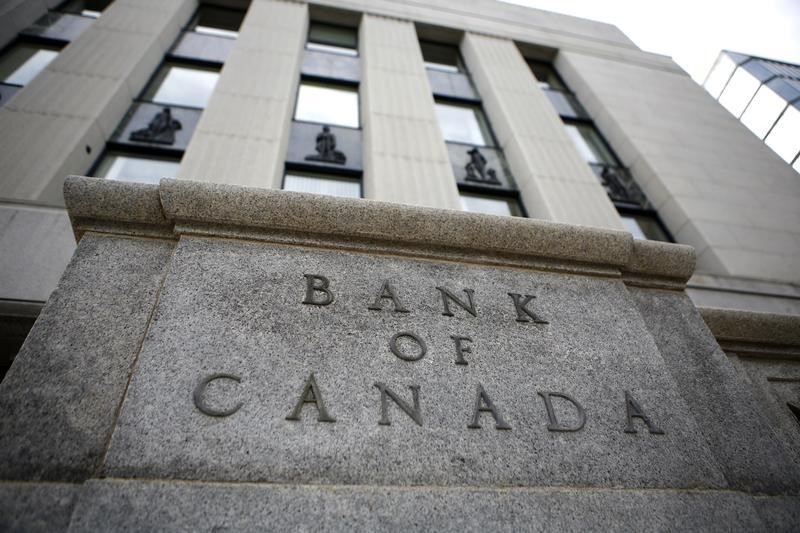OTTAWA, May 9 (Reuters) - The Bank of Canada should be ready
to cut interest rates again if growth falters, though the
economy looks set for a modest recovery from the oil price shock
in the near term, a report from the International Monetary Fund
said on Monday.
In an annual assessment of Canada's economy, IMF staff said
that the Bank of Canada's decision to cut rates last year, along
with the depreciation of the Canadian dollar, have helped to
cushion the effects of cheaper oil, which is a major export for
Canada.
Although the central bank should consider moving again if
necessary, room for additional cuts is limited with rates
already at 0.50 percent, the report noted.
The bank could use unconventional monetary policy measures
if the economy slowed significantly or there were signs of
deflation, but clear communication would be critical, the report
said.
The bank last year updated the extraordinary tools it has at
its disposal, which include negative interest rates, forward
guidance, large-scale asset purchases and funding for credit.
Nonetheless, it should not be up to monetary policy alone to
support the economy and the federal government has room to
increase its fiscal support if the situation weakens, IMF staff
said.
The budget released by the new Liberal government earlier
this year is "appropriate" with its spending on infrastructure
to boost growth. The report estimated that the stimulus measures
will boost annual growth by 0.5 percentage point of gross
domestic product in each of the next two fiscal years.
While growth is seen rising to 1.75 percent this year and
2.25 percent next year, the risks to Canada's outlook are to the
downside as oil prices remain low, and with increased
uncertainty about global growth prospects.
The potential for a severe recession to destabilize Canada's
housing market is also a risk as the use of government-backed
mortgage insurance could lead to a considerable impact on the
government's fiscal position.
Still, steps taken by the government in recent years to
reduce risk in the housing market have been "broadly effective",
the report said, recommending a cap on loan-to-income ratios
could be introduced to tackle regional imbalances.
- English (USA)
- English (UK)
- English (India)
- English (Australia)
- English (South Africa)
- English (Philippines)
- English (Nigeria)
- Deutsch
- Español (España)
- Español (México)
- Français
- Italiano
- Nederlands
- Português (Portugal)
- Polski
- Português (Brasil)
- Русский
- Türkçe
- العربية
- Ελληνικά
- Svenska
- Suomi
- עברית
- 日本語
- 한국어
- 简体中文
- 繁體中文
- Bahasa Indonesia
- Bahasa Melayu
- ไทย
- Tiếng Việt
- हिंदी
Bank of Canada should mull rate cut again if needed -IMF report
Published 2016-05-09, 10:30 a/m
Bank of Canada should mull rate cut again if needed -IMF report

Latest comments
Install Our App
Risk Disclosure: Trading in financial instruments and/or cryptocurrencies involves high risks including the risk of losing some, or all, of your investment amount, and may not be suitable for all investors. Prices of cryptocurrencies are extremely volatile and may be affected by external factors such as financial, regulatory or political events. Trading on margin increases the financial risks.
Before deciding to trade in financial instrument or cryptocurrencies you should be fully informed of the risks and costs associated with trading the financial markets, carefully consider your investment objectives, level of experience, and risk appetite, and seek professional advice where needed.
Fusion Media would like to remind you that the data contained in this website is not necessarily real-time nor accurate. The data and prices on the website are not necessarily provided by any market or exchange, but may be provided by market makers, and so prices may not be accurate and may differ from the actual price at any given market, meaning prices are indicative and not appropriate for trading purposes. Fusion Media and any provider of the data contained in this website will not accept liability for any loss or damage as a result of your trading, or your reliance on the information contained within this website.
It is prohibited to use, store, reproduce, display, modify, transmit or distribute the data contained in this website without the explicit prior written permission of Fusion Media and/or the data provider. All intellectual property rights are reserved by the providers and/or the exchange providing the data contained in this website.
Fusion Media may be compensated by the advertisers that appear on the website, based on your interaction with the advertisements or advertisers.
Before deciding to trade in financial instrument or cryptocurrencies you should be fully informed of the risks and costs associated with trading the financial markets, carefully consider your investment objectives, level of experience, and risk appetite, and seek professional advice where needed.
Fusion Media would like to remind you that the data contained in this website is not necessarily real-time nor accurate. The data and prices on the website are not necessarily provided by any market or exchange, but may be provided by market makers, and so prices may not be accurate and may differ from the actual price at any given market, meaning prices are indicative and not appropriate for trading purposes. Fusion Media and any provider of the data contained in this website will not accept liability for any loss or damage as a result of your trading, or your reliance on the information contained within this website.
It is prohibited to use, store, reproduce, display, modify, transmit or distribute the data contained in this website without the explicit prior written permission of Fusion Media and/or the data provider. All intellectual property rights are reserved by the providers and/or the exchange providing the data contained in this website.
Fusion Media may be compensated by the advertisers that appear on the website, based on your interaction with the advertisements or advertisers.
© 2007-2024 - Fusion Media Limited. All Rights Reserved.